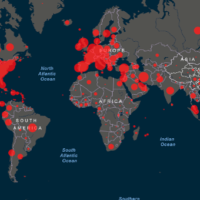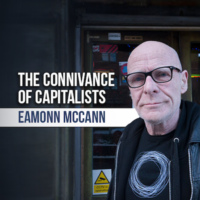-
The Politics of the coronavirus conjuncture in Ireland
The election in Ireland in early February marked a clear acceleration of the country’s ongoing left turn over recent years. Then came the virus.
-
America’s super-rich see their wealth rise by $282 Billion in three weeks of pandemic
America’s billionaires have accrued more wealth in the past three weeks alone than they made in total prior to 1980.
-
A crisis like no other: social reproduction and the regeneration of capitalist life during the COVID-19 pandemic
As the COVID-19 health crisis deepens, it looks increasingly clear that the short-term collapse in global output is likely to exceed that of any recession in the last 150 years–that is, in the entire history of capitalism. The ILO estimates that the crisis will lead to the destruction of 195 million jobs. Hence, after discussing at length the epidemiology of the COVID-19 pandemic, media attention is now increasingly focused on how to restart the global economic engine.
-
Capitalism’s weak doses of socialism to treat the economic infection of COVID-19
The same proposals that were demonized yesterday as radical socialism are embraced today to save the society from collapse.
-
Pandemic story: failures, forebodings, signs of solidarity
A great hazard looms. Under duress and as chaos mounts, capital may find it useful to revert to the extremist, even brutal, measures figuring in its past.
-
Marx in the era of pandemic capitalism
How could Karl Marx (1818–1883) help us interpret the current crisis? His theory of history offers critical resources to interpret the unprecedented crisis which is shaking the world today, while indicating at the same time that ‘the world after’ so much mentioned could only be anti-capitalist.
-
Cuba: from AIDS, Dengue, and Ebola to COVID-19
Cuba’s preparation for COVID-19 began on January 1, 1959. On that day, it laid the foundations for what would become the discovery of novel drugs, bringing patients to the island, and sending medical aid abroad. Coping with HIV/AIDS, dengue fever and Ebola helped Cuba develop the ability to cope with pandemics, both internally and abroad.
-
Pandemic and socialism
As COVID-19 grips the world, in country after country, there is socialization of healthcare and of production of some essential goods, which markedly departs from the capitalist norm
-
Could COVID-19 bring down the U.S. empire?
With the U.S. failing and China taking a leadership role in the international response to this crisis, could the COVID-19 crisis mark a turning point in the transition to a multipolar world in which China will be just as important as a world leader as the United States?
-
The connivance of capitalists
Socialist ideas have been jeered and sneered at by the same establishment now faced with the consequences of their profit driven contempt. We should be done with those bellowing cheerleaders of capitalism, argues Eamonn McCann.
-
This pandemic is ecological breakdown: Different tempo, same song
Comparisons between the toll of COVID-19 and climate change are not helpful because they view each as two separate “things”
-
Engels on nature and humanity
In the light of the current pandemic, here is a rough excerpt from my upcoming short book on Engels’ contribution to Marxian political economy on the 200th anniversary of his birth.
-
Brother Ali – Uncle Sam Goddamn
Ali raps in his verses that America is not the great place people make it out to be. He reminds us that slavery was present only two generations ago and extremely violent hate crimes occurred in the country. He also compares paying taxes to paying a homeless man for crack. Tax money is just supporting the war in the Middle East.
-
Why coronavirus could spark a capitalist supernova
There is no magic money tree – the ‘rescue packages’ aim to rescue a rotten system, and won’t work.
-
Austria’s ‘Unsozial’ Capitalists in a Time of Crisis
In a move seemingly reserved only for cartoonish villains, one of Austria’s best-known millionaires, Attila Doğudan, CEO of DO &CO—one of the largest culinary companies in Austria, and who employs over 11,000 people worldwide—has used the COVID-19 crisis to orchestrate a widespread layoff campaign against all restaurant employees within Austria.
-
Catastrophe capitalism: climate change, COVID-19, and economic crisis
Obviously, the situation associated with the sudden appearance of the SARS-CoV-2 virus and the COVID-19 pandemic is grim all over the world. Both the causes and the consequences are closely related to capitalist social relations.
-
All the craziest things about America are being highlighted by this virus
“Corona is a black light and America is a cum-stained hotel room,” comedian Megan Amram colorfully tweeted a couple of weeks ago. Her observation has only grown more accurate since.
-
Is capitalism a disease?
When health policy is looked at from the point of view of which issues involve a direct confrontation with ruling-class interest, which involve simply relative benefits to a class, and which are neutral, we can predict which kinds of measures are possible—highlighting the lie in the notion society is trying to improve health for all.
-
Anti-capitalist politics in the time of COVID-19
When trying to interpret, understand and analyze the daily flow of news, I tend to locate what is happening against the background of two distinctive but intersecting models of how capitalism works.
-
The Cocoon Sessions Episode 2: People aren’t the problem, capitalism is
Snuggle in with us for another Cocoon Session where we give you a really cool and easy trick to hack your anxiety, talk about the way the quarantine is changing the world good and bad, and finally Caitlin has her proof that humans are not the problem after all.




















